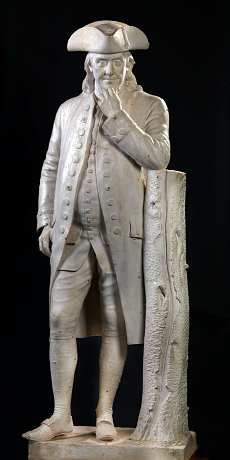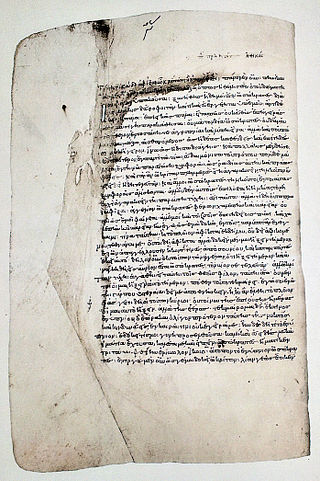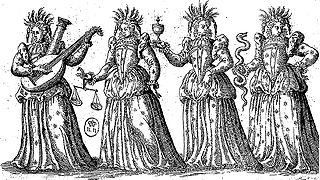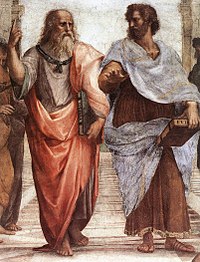
Courage is the choice and willingness to confront agony, pain, danger, uncertainty, or intimidation. Valor is courage or bravery, especially in battle.

A virtue is a trait of excellence, including traits that may be moral, social, or intellectual. The cultivation and refinement of virtue is held to be the "good of humanity" and thus is valued as an end purpose of life or a foundational principle of being. In human practical ethics, a virtue is a disposition to choose actions that succeed in showing high moral standards: doing what is right and avoiding what is wrong in a given field of endeavour. When someone takes pleasure in doing what is right, even when it is difficult or initially unpleasant, they can establish virtue as a habit. Such a person is said to be virtuous through having cultivated such a disposition. The opposite of virtue is vice, and the vicious person takes pleasure in habitual wrong-doing to their detriment.
Eudaimonia, sometimes anglicized as eudaemonia or eudemonia, is a Greek word literally translating to the state or condition of 'good spirit', and which is commonly translated as 'happiness' or 'welfare'.

Virtue ethics is an approach that treats virtue and character as the primary subjects of ethics, in contrast to other ethical systems that put consequences of voluntary acts, principles or rules of conduct, or obedience to divine authority in the primary role.
"Form of the Good", or more literally "the idea of the good", is a concept in the philosophy of Plato. The definition of the Good is a perfect, eternal, and changeless Form, existing outside space and time. It is a Platonic ideal.

Moral character or character is an analysis of an individual's steady moral qualities. The concept of character can express a variety of attributes, including the presence or lack of virtues such as empathy, courage, fortitude, honesty, and loyalty, or of good behaviors or habits; these attributes are also a part of one's soft skills.
Kalos kagathos or kalokagathos, of which kalokagathia (καλοκαγαθία) is the derived noun, is a phrase used by classical Greek writers to describe an ideal of gentlemanly personal conduct, especially in a military context.

Arete is a concept in ancient Greek thought that, in its most basic sense, refers to "excellence" of any kind—especially a person or thing's "full realization of potential or inherent function." The term may also refer to excellence in "moral virtue."

The Nicomachean Ethics is Aristotle's best-known work on ethics: the science of the good for human life, that which is the goal or end at which all our actions aim. It consists of ten sections, referred to as books or scrolls, and is closely related to Aristotle's Eudemian Ethics. The work is essential in explaining Aristotelian ethics.

Crito is a dialogue that was written by the ancient Greek philosopher Plato. It depicts a conversation between Socrates and his wealthy friend Crito of Alopece regarding justice (δικαιοσύνη), injustice (ἀδικία), and the appropriate response to injustice after Socrates's imprisonment, which is chronicled in the Apology.
In Ancient Greek philosophy, techne is a philosophical concept that refers to making or doing. Today the modern definition and use of "practical knowledge" is similar to the Ancient Greek definition of techne, whereas the latter can include various fields such as mathematics, geometry, medicine, shoemaking, rhetoric, philosophy, music, and astronomy. One of the definitions led by Aristotle, for example, is "a state involving true reason concerned with production".

Ethos is a Greek word meaning 'character' that is used to describe the guiding beliefs or ideals that characterize a community, nation, or ideology; and the balance between caution, and passion. The Greeks also used this word to refer to the power of music to influence emotions, behaviors, and even morals. Early Greek stories of Orpheus exhibit this idea in a compelling way. The word's use in rhetoric is closely based on the Greek terminology used by Aristotle in his concept of the three artistic proofs or modes of persuasion alongside pathos and logos. It gives credit to the speaker, or the speaker is taking credit.
Phronesis, is a type of wisdom or intelligence relevant to practical action. It implies both good judgment and excellence of character and habits, and was a common topic of discussion in ancient Greek philosophy. Classical works about this topic are still influential today. In Aristotelian ethics, the concept was distinguished from other words for wisdom and intellectual virtues—such as episteme and sophia—because of its practical character. The traditional Latin translation is prudentia, which is the source of the English word "prudence". Among other proposals, Thomas McEvilley has proposed that the best translation is "mindfulness".

The cardinal virtues are four virtues of mind and character in both classical philosophy and Christian theology. They are prudence, justice, fortitude, and temperance. They form a virtue theory of ethics. The term cardinal comes from the Latin cardo (hinge); these four virtues are called “cardinal” because all other virtues fall under them and hinge upon them.

Virtue epistemology is a current philosophical approach to epistemology that stresses the importance of intellectual and specifically epistemic virtues. Virtue epistemology evaluates knowledge according to the properties of the persons who hold beliefs in addition to or instead of the properties of the propositions and beliefs. Some advocates of virtue epistemology also adhere to theories of virtue ethics, while others see only loose analogy between virtue in ethics and virtue in epistemology.
Akrasia is a lack of self-control or acting against one's better judgment. It is sometimes translated into English as incontinence. Beginning with Plato, a variety of philosophers have attempted to determine whether or not akrasia exists and how best to define it.
The goldenmean or golden middle way is the desirable middle between two extremes, one of excess and the other of deficiency. It appeared in Greek thought at least as early as the Delphic maxim "nothing in excess", which was discussed in Plato's Philebus. Aristotle analyzed the golden mean in the Nicomachean Ethics Book II: That virtues of character can be described as means. It was subsequently emphasized in Aristotelian virtue ethics.
Aristotle first used the term ethics to name a field of study developed by his predecessors Socrates and Plato which is devoted to the attempt to provide a rational response to the question of how humans should best live. Aristotle regarded ethics and politics as two related but separate fields of study, since ethics examines the good of the individual, while politics examines the good of the City-State, which he considered to be the best type of community.

Magnanimity is the virtue of being great of mind and heart. It encompasses, usually, a refusal to be petty, a willingness to face danger, and actions for noble purposes. Its antithesis is pusillanimity. Although the word magnanimity has a traditional connection to Aristotelian philosophy, it also has its own tradition in English which now causes some confusion.

Moral intellectualism or ethical intellectualism is a view in meta-ethics according to which genuine moral knowledge must take the form of arriving at discursive moral judgements about what one should do. One way of understanding this is that doing what is right is a reflection of what any being knows is right. However, it can also be interpreted as the understanding that a rationally consistent worldview and theoretical way of life, as exemplified by Socrates, is superior to the life devoted to a moral life.












